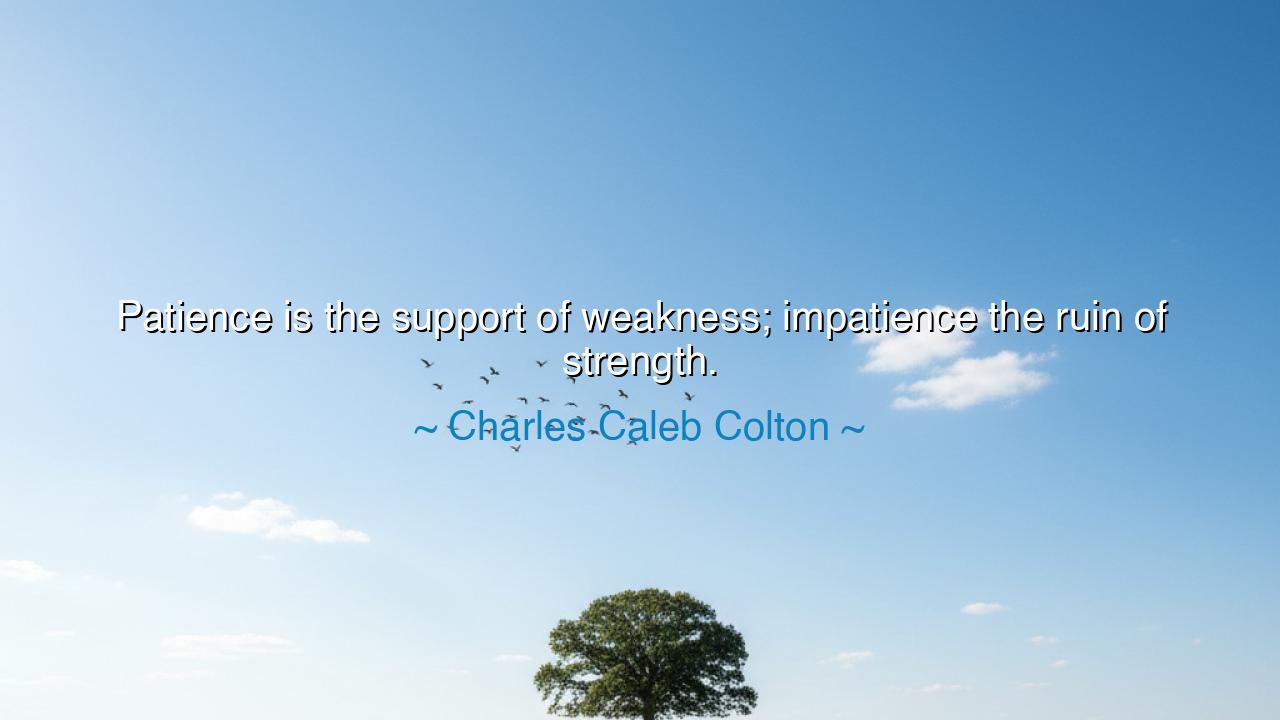
Patience is the support of weakness; impatience the ruin of






Hear the solemn words of Charles Caleb Colton, a man who knew both the vanity of pride and the quiet power of endurance: “Patience is the support of weakness; impatience the ruin of strength.” In this truth lies a great paradox, one which the ancients themselves often proclaimed: that true power is not always found in action, but in restraint. To the weak, patience is a shield that allows them to endure until strength returns. To the strong, impatience is a hidden enemy, for though they may conquer outward foes, they are undone by their own restless spirit.
Patience is the art of waiting with dignity. It is the companion of the wounded, the weary, and the frail. When the body falters, patience allows the spirit to endure until healing comes. When fortune withdraws her hand, patience keeps hope alive until opportunity returns. For the weak, patience is not defeat but survival; it is the staff that keeps them from falling, the lamp that keeps them from being swallowed by despair. Without patience, weakness collapses into ruin.
Yet Colton reminds us also of the opposite truth: impatience is the ruin of strength. Many who are mighty in body and spirit, who wield influence or courage, destroy themselves not by weakness but by haste. They strike before the moment is ripe, they act before wisdom has spoken, they demand results before the soil has borne fruit. Thus, their strength, which might have secured victory, becomes wasted in folly. Impatience blinds them, and what could have been triumph ends in collapse.
Consider the tale of Julius Caesar. His patience, in the long campaigns of Gaul, allowed him to wear down enemies stronger in number, waiting for the perfect time to strike. It was this patience that made his legions victorious. Yet in his later years, impatience for power consumed him. He could not wait for destiny to raise him in due time, and his haste to grasp the crown stirred fear and envy among his peers. The knives of the Senate ended him. Here, strength undone by impatience became tragedy.
Or reflect on the patience of Mahatma Gandhi. Without armies, without wealth, without worldly power, he seemed weak before an empire. Yet his patience—his steadfast endurance through long years of resistance—became the very weapon that broke the chains of his people. What the strong could not achieve by violence, the patient achieved by unyielding spirit. Gandhi’s life became living proof that patience supports weakness until weakness is transformed into victory.
The lesson, O seeker of wisdom, is this: do not despise patience, for it is the mother of endurance and the guardian of strength. If you are weak, cling to patience, for it will keep you alive until strength returns. If you are strong, guard yourself against impatience, for it will turn your power into recklessness and ruin. Remember: strength without patience is like a wild stallion—powerful, but dangerous to its rider.
Practical steps are these: when hardship comes, resist the urge to despair. Say to yourself, “I will wait. I will endure.” When you feel the fire of strength urging you to haste, pause and ask, “Is this the right time, or am I being ruled by impatience?” Train your soul to hold steady in storms and to act only when wisdom has ripened the moment. Write this truth upon your heart: patience preserves, impatience destroys.
Thus remember Colton’s wisdom: patience is the ally of the weak and the crown of the strong. Impatience is the betrayer that turns power into ruin. Walk, then, with endurance in your weakness and with restraint in your strength, and you will master both your trials and yourself. For the true hero is not the one who moves fastest, but the one who endures longest and acts at the right time.






AAdministratorAdministrator
Welcome, honored guests. Please leave a comment, we will respond soon